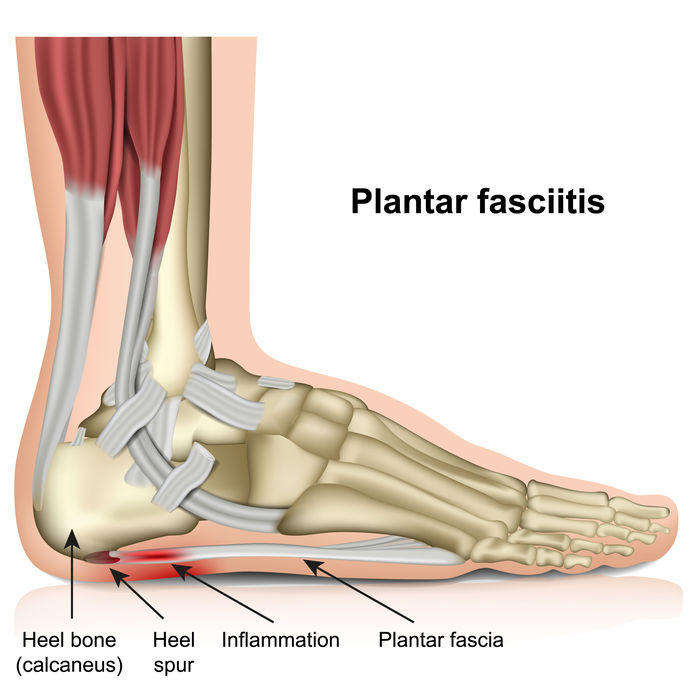 Plantar fasciitis entails the inflammation of the tissue in the arch of your foot, which is the part that aids you to walk. It manifests itself as pain in the heel and the adjoining parts. The severity of the pain is mostly excessive in the morning, but normally subsides moving around through the course of the day. However, it might return after exerting more stress to the foot through extended periods of standing.
Plantar fasciitis entails the inflammation of the tissue in the arch of your foot, which is the part that aids you to walk. It manifests itself as pain in the heel and the adjoining parts. The severity of the pain is mostly excessive in the morning, but normally subsides moving around through the course of the day. However, it might return after exerting more stress to the foot through extended periods of standing.
Plantar fasciitis hugely affects the normal range of motion of the bones, the joints in the foot, and the ankle, inhibiting the correct motion of the foot. Any misalignment in the foot culminates into the inflammation. Tightening of the soft tissue may also result to very severe pain.
Causes and Symptoms
Research has depicted that the causes of plantar fasciitis are not succinctly clear. However, there is a popular belief that exerting too much stress on the plantar fascia causes plantar fasciitis, as the tension becomes too immense thus resulting to tears. The most common symptom is a very severe pain at the lowest part of the foot in the areas close and proximate to the heel.
Who is at Risk of Plantar Fasciitis?
Athletes who run regularly are very susceptible to plantar fasciitis. Aerobic and ballet dancers are always at risk of a very early diagnosis, as they exert too much pressure on the heel and the surrounding tissue. Obese people or those who experience rapid weight gain may also be at risk of plantar fasciitis. Anyone who has the knack of wearing shoes without proper support also has a high probability of suffering from this condition. You might also be at risk of getting plantar fasciitis with the progression of age, as it is very common amongst people aged 40 to 60.
If your profession dictates that you are standing most of the time, this implies that you are at a risk of damaging your plantar fascia. Finally, unusual walks, high arches, tight Achilles tendons, and wearing shoes with very thin soles also puts you at a very high risk of getting plantar fasciitis.
Chiropractic Care and Adjustments
There is a notion that chiropractic care is only vital when addressing issues pertaining to the spine. However, the truth is that all joints present in the body can be assessed and adjusted in order to restore correct and proper motion through chiropractic care. This part of the article looks at how chiropractic care helps with plantar fasciitis.
- It Reduces Stress in the Ligament
Your chiropractor can make several adjustments in the foot and ankle to remove any stress from the heel. Your chiropractor will help to reduce stress from the ligament, ensuring it can heal through these adjustments. This ultimately helps to restore and correct motion.
- It Acts as an Adjunct to Other Treatments
Chiropractic care is a natural treatment. It is also non-invasive. It therefore works very well alongside other treatments for plantar fasciitis. Consequently, it is very effective when combined with treatments like physical and massage therapies. Recovery from this condition normally takes several months. However, studies reveal that a combination of chiropractic care with these other treatments can heal almost 90% of plantar fasciitis cases.
- It Minimizes the Possibility of Experiencing Secondary Injuries
Chiropractic care helps to remedy problems such as misalignments that are caused by other factors such as a change of gait. This is because these misalignments can cause other problems such as back and ankle problems if left unchecked.
- It Promotes Healing
Some parts of chiropractic care entail specified and recommended exercises that help to stretch the plantar fascia. If these exercises are combined with regular visits to the chiropractor, there shall be faster healing of the current prevailing condition. This shall also work perfectly to prevent and deter any possible recurrence of the condition. Nutritional adjustments can also be combined with chiropractic care to help with the pain spawning from this condition.
Plantar fasciitis is the inflammation of the tissue in the arch of your foot. The condition is characterized by pain in the heel and other parts close to it. Anybody that engages in too much activity using their feet is at risk of plantar fasciitis. Luckily, this condition can be remedied through chiropractic care.
Chiropractic care is ideal in relieving pain and lessening the symptoms of plantar fasciitis. It is non-invasive and non-pharmacological, making it very safe. Its tailored and bespoke adjustments significantly help to increase your mobility. Simply put, chiropractic care is a very holistic treatment for plantar fasciitis, as it helps restore function and wellness.

